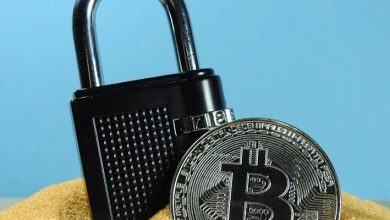How to Safely Store Your Private Keys

- Understanding the importance of private keys
- Best practices for generating strong private keys
- Choosing the right storage method for your private keys
- Protecting your private keys from unauthorized access
- Backup strategies to prevent losing your private keys
- Regularly updating and securing your private keys
Understanding the importance of private keys
Private keys are a crucial component of cryptocurrency security. They are essentially the password that allows you to access and manage your digital assets. Without your private key, you will not be able to send or receive funds, making it essential to keep it safe and secure.
When it comes to storing your private keys, there are a few key points to keep in mind. Firstly, never share your private key with anyone else. This includes friends, family, or even trusted individuals. Your private key should be kept confidential at all times to prevent unauthorized access to your funds.
Additionally, it is important to store your private key offline whenever possible. This can be done by using a hardware wallet or writing down your private key on a piece of paper and storing it in a secure location. By keeping your private key offline, you reduce the risk of it being compromised by hackers or malware.
Understanding the importance of private keys is crucial for anyone looking to safely store their digital assets. By following best practices and keeping your private key secure, you can help protect your investments and ensure peace of mind when it comes to managing your cryptocurrency holdings.
Best practices for generating strong private keys
One of the best practices for generating strong private keys is to use a reputable random number generator to ensure unpredictability. This will help prevent any potential attackers from guessing or reverse-engineering your private key. Additionally, it is recommended to use a combination of uppercase and lowercase letters, numbers, and special characters to increase the complexity of the private key.
Another important consideration is the length of the private key. It is generally recommended to use private keys that are at least 256 bits in length to provide a sufficient level of security. Longer private keys can offer even greater protection against brute force attacks.
Furthermore, it is crucial to keep your private keys secure and confidential. Avoid sharing your private keys with anyone and store them in a safe and encrypted location. Regularly update your private keys and consider using a secure password manager to help manage and protect them.
By following these best practices for generating strong private keys, you can help ensure the security of your sensitive information and assets. Remember to always prioritize security when it comes to storing and managing your private keys to mitigate the risk of unauthorized access.
Choosing the right storage method for your private keys
When it comes to safeguarding your private keys, choosing the right storage method is crucial. There are several options available, each with its own set of pros and cons. One popular choice is to use a hardware wallet, which is a physical device that securely stores your keys offline. This provides an extra layer of protection against online threats such as hacking and phishing.
Another option is to store your private keys in a secure cloud storage service. While this may seem convenient, it also comes with its own risks, such as the potential for data breaches. It’s important to choose a reputable provider with a strong track record of security.
For those who prefer a more traditional approach, storing your private keys in a safe deposit box at a bank is a viable option. This provides physical security for your keys, but it may not be as accessible as other methods.
Ultimately, the best storage method for your private keys will depend on your individual needs and preferences. It’s important to weigh the pros and cons of each option carefully before making a decision. Whichever method you choose, be sure to regularly backup your keys and keep them in a secure location to prevent loss or theft.
Protecting your private keys from unauthorized access
When it comes to protecting your private keys from unauthorized access, there are several important strategies to keep in mind. One crucial step is to avoid storing your private keys on any device that is connected to the internet. This can help prevent hackers from gaining access to your keys through cyber attacks.
Another key point to consider is using strong encryption to secure your private keys. By encrypting your keys with a strong password, you can add an extra layer of security that can help prevent unauthorized access.
It is also important to regularly back up your private keys and store them in a secure location. By keeping multiple copies of your keys in separate physical locations, you can ensure that you will not lose access to your funds if one copy is lost or compromised.
Additionally, consider using a hardware wallet to store your private keys. Hardware wallets are physical devices that store your keys offline, making them less vulnerable to online threats. By using a hardware wallet, you can add an extra level of security to your key storage strategy.
Backup strategies to prevent losing your private keys
One of the most important aspects of securely storing your private keys is to have a reliable backup strategy in place. Losing access to your private keys can result in losing access to your digital assets, so it is crucial to have a plan in place to prevent this from happening.
One effective backup strategy is to create multiple copies of your private keys and store them in different secure locations. This way, if one copy is lost or compromised, you will still have access to your keys through the other copies. Additionally, consider using encrypted USB drives or external hard drives to store your backups for an extra layer of security.
Another option is to use a paper backup method, where you write down your private keys on a piece of paper and store it in a safe place. This can be a reliable backup solution as long as you keep the paper secure and protected from damage or theft.
It is also important to regularly update your backups to ensure they are current and reflect any changes or additions to your private keys. Set a schedule to review and update your backups periodically to maintain the integrity of your backup strategy.
By implementing a robust backup strategy for your private keys, you can greatly reduce the risk of losing access to your digital assets. Take the time to create multiple backups, use secure storage methods, and stay vigilant in maintaining and updating your backups to safeguard your private keys.
Regularly updating and securing your private keys
Ensuring the security of your private keys is paramount in safeguarding your digital assets. One crucial aspect of protecting your private keys is regularly updating and securing them. By frequently updating your private keys, you can mitigate the risk of unauthorized access and potential theft.
It is essential to store your private keys in a secure location, such as a hardware wallet or a secure offline storage solution. Regularly backing up your private keys and storing them in multiple secure locations can provide an additional layer of protection.
Implementing strong encryption measures and utilizing password managers can further enhance the security of your private keys. Additionally, enabling two-factor authentication and regularly monitoring your accounts for any suspicious activity can help prevent unauthorized access to your private keys.
By staying vigilant and proactive in updating and securing your private keys, you can better protect your digital assets and minimize the risk of potential security breaches. Remember, the safety of your private keys is crucial in ensuring the security of your cryptocurrencies and other digital assets.



